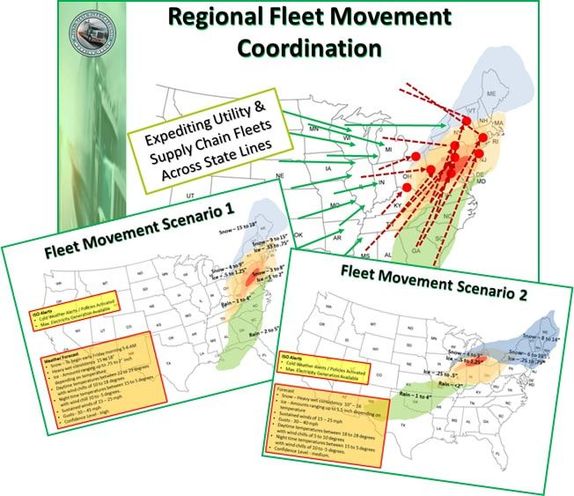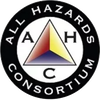
Background
To expedite power restoration across the nation, expedited utility fleet movement across state lines and the Canadian border is essential.
Specifically, when the electric sector companies prepare for potential threats, depending on predicted event severity, many resource acquisition and implementation processes may start. This process can be initiated by sector mutual aid conference calls where resources availability information and allocation occurs. The resources can include equipment, commercial vehicles, industry personnel (lines, damage assessors, logistics, etc.), contractors, and vendors.
When state government awareness and assistance in the expediting process is rendered and received, it has been recognized that the movement of these private sector resources can dramatically affect a response and have a direct effect on returning to normal state.
Finding: A one hour delay during fleet movement can impact restoration efforts by 24 hours.
Having all states (e.g. both impacted and pass through states) engaged and coordinated across a wide geographic region of multiple jurisdictions is critical to fleet movement and the power restoration process.
Purpose
The purpose of this Regional Fleet Movement Coordination Initiative is to provide information from the private sector to state government operational leadership of the movement of fleet/resource movement into a potentially impacted region(s) from around the country and Canada in response to a specific disaster (emergency event). This will be a multi-state process and is designed to have both the “impacted states” as well as the “pass through states” engaged.
The Regional Fleet Movement Coordination Initiative uses “email” (and conference calls if needed) to supply state government agencies with the big picture related to the private sector’s resource movement. State agencies process this data and provide feedback and/or guidance related to their state’s weigh stations, toll stations, declarations, restricted road usage, and other related fleet movement related information.
Supporting Documents & Resources:
1) Documents:
a. Fleet Movement Coordination Initiative Information Packet (revised 5-25-2015)
b. Guidance for Regional Mutual Assistance Group (RMAG) for Fleet Movement Coordination Process (revised 6/1/2015)
2) YouTube Videos:
a. Initiating the Fleet Movement Coordination Process (revised 5-25_2014)
To expedite power restoration across the nation, expedited utility fleet movement across state lines and the Canadian border is essential.
Specifically, when the electric sector companies prepare for potential threats, depending on predicted event severity, many resource acquisition and implementation processes may start. This process can be initiated by sector mutual aid conference calls where resources availability information and allocation occurs. The resources can include equipment, commercial vehicles, industry personnel (lines, damage assessors, logistics, etc.), contractors, and vendors.
When state government awareness and assistance in the expediting process is rendered and received, it has been recognized that the movement of these private sector resources can dramatically affect a response and have a direct effect on returning to normal state.
Finding: A one hour delay during fleet movement can impact restoration efforts by 24 hours.
Having all states (e.g. both impacted and pass through states) engaged and coordinated across a wide geographic region of multiple jurisdictions is critical to fleet movement and the power restoration process.
Purpose
The purpose of this Regional Fleet Movement Coordination Initiative is to provide information from the private sector to state government operational leadership of the movement of fleet/resource movement into a potentially impacted region(s) from around the country and Canada in response to a specific disaster (emergency event). This will be a multi-state process and is designed to have both the “impacted states” as well as the “pass through states” engaged.
The Regional Fleet Movement Coordination Initiative uses “email” (and conference calls if needed) to supply state government agencies with the big picture related to the private sector’s resource movement. State agencies process this data and provide feedback and/or guidance related to their state’s weigh stations, toll stations, declarations, restricted road usage, and other related fleet movement related information.
Supporting Documents & Resources:
1) Documents:
a. Fleet Movement Coordination Initiative Information Packet (revised 5-25-2015)
b. Guidance for Regional Mutual Assistance Group (RMAG) for Fleet Movement Coordination Process (revised 6/1/2015)
2) YouTube Videos:
a. Initiating the Fleet Movement Coordination Process (revised 5-25_2014)

